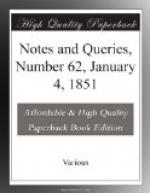“DEFENDER OF THE FAITH.”
(Vol. ii., pp. 442. 481.)
I regret that my Note, inserted in your paper of Nov. 30th, was so ambiguously written as to elicit such a reply as it has been favoured with by MR. GIBSON of Newcastle-upon-Tyne.
What I meant to say in my last Note was simply this—that two persons, viz. Messrs. Christopher Wren and Chamberlayne, have asserted that the title “Defender of the Faith” had been used by our monarchs anterior to 1521; and in support of their assertions, cite the Black Book of the order of the garter, and several charters granted to the University of Oxford: that is, each gives a distinct proof of his allegation.
Had MR. GIBSON understood my Note, as I trust he now will, he will see at once that the expression “untrue” is totally inapplicable to their statements, at least upon any showing upon his part; for he does not appear to me to have consulted either the Black Book or the charters, on which alone their assertions are based, to which alone we must in common honesty refer, and by which alone their veracity must be judged.
That their “startling” statements do not appear in Selden, nor in Luder’s brief paper in the 19th vol. of the Archaeologia, is conceded; but I think it might have occurred to the mind of one of less acumen than MR. GIBSON, that it was precisely because the allegations do not appear in these or any other writers or authorities that I considered them not unworthy of the attention of the readers of the “NOTES AND QUERIES”. I am at a loss to reconcile MR. GIBSON’S expression “startling,” as applied to the assertions of Messrs. Wren and Chamberlayne (and I need not add, that had they not been startling to myself as to him, they would never have found their way to your paper), with the following paragraph:
“In this sense, the
sovereign and every knight became a sworn defender
of the faith. Can this
duty have come to be popularly attributed as
part of the royal style and
title?”
I do not allude to this statement in a critical point of view, but simply, as, from the general tenor of his communication, MR. GIBSON appears to labour under an impression, that, from ignorance of historical authorities, I have merely given utterance to a popular fallacy, unheard of by him and other learned men; and, like the “curfew,” to be found in no contemporaneous writer. I beg, however, to assure him, that before forwarding the note and question to your paper, I had examined not only the Bulls, and our best historians, but also the works of such writers as Prynne, Lord Herbert, Spelman, Camdem, and others, who have in any way treated of regal titles and prerogatives.
I have only to add, that beyond the investigation of the truth of the assertions of Messrs. Wren and Chamberlayne, I am not in any way interested. I care not for the result. I only seek for the elucidation of that which is at once “startling” and a “popular fallacy”.




